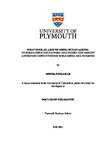WRAP YOUR AD AROUND MEDIA MULTITASKING: UNDERSTANDING THE FACTORS THAT INHIBIT AND AMPLIFY ADVERTISING EFFECTIVENESS WHILE MEDIA MULTITASKING
| dc.contributor.supervisor | White, John | |
| dc.contributor.author | Bhaskar, Shikhar | |
| dc.contributor.other | Plymouth Business School | en_US |
| dc.date.accessioned | 2021-09-10T13:47:51Z | |
| dc.date.issued | 2021 | |
| dc.identifier | 10562759 | en_US |
| dc.identifier.uri | http://hdl.handle.net/10026.1/17784 | |
| dc.description.abstract |
This thesis presents that not all media multitasking is detrimental to the advertising messages, by identifying situations when advertising can have a positive effect on the advertising outcomes. The contemporary research in media multitasking posits that media multitasking results in poor memory and higher evaluation of advertisements while media multitasking; however, there are contexts when the memory of advertisements is higher while media multitasking. Building on these contexts, this thesis presents three different experiments to test the effect of media multitasking on advertising memory and attitude. In the first study, the past literature is tested by comparing single-tasking with media multitasking on its effect on brand memory and brand attitude. It also compares the varied cognitive load of media multitasking in their effect on memory and attitude. In the second study, the difficulty experienced during media multitasking’s role is explored. The mediating role of difficulty in the effect of media multitasking on advertising memory is tested. Physical and cognitive type of difficulty and their effect on advertising memory is also tested. In the third study, the role of processing ease of processing fluency in explaining the effect of synced advertising on brand memory and brand attitude is tested. The moderating role of privacy concern and attractiveness of endorsers is also tested on the positive effect of processing fluency on advertising outcomes. The results of this thesis establish that cognitive difficulty is detrimental to media multitasking, whereas physical difficulty does not have an adverse effect. Similarly, cognitive ease or processing fluency facilitates the positive effect of media multitasking on advertising outcomes. | en_US |
| dc.language.iso | en | |
| dc.publisher | University of Plymouth | |
| dc.subject.classification | PhD | en_US |
| dc.title | WRAP YOUR AD AROUND MEDIA MULTITASKING: UNDERSTANDING THE FACTORS THAT INHIBIT AND AMPLIFY ADVERTISING EFFECTIVENESS WHILE MEDIA MULTITASKING | en_US |
| dc.type | Thesis | |
| plymouth.version | publishable | en_US |
| dc.identifier.doi | http://dx.doi.org/10.24382/611 | |
| dc.identifier.doi | http://dx.doi.org/10.24382/611 | |
| dc.rights.embargodate | 2022-09-10T13:47:51Z | |
| dc.rights.embargoperiod | 12 months | en_US |
| dc.type.qualification | Doctorate | en_US |
| rioxxterms.version | NA |
Files in this item
This item appears in the following Collection(s)
-
01 Research Theses Main Collection
Research Theses Main


